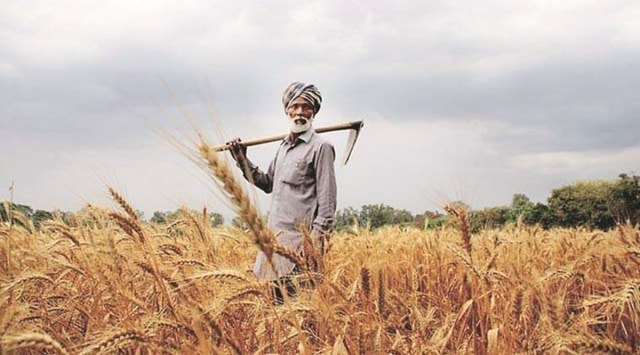- India
- International
Ahead of polls, new idea on the table: bad bank for farm loans
🔴 At present, there is neither a unified mechanism to tackle NPAs in the farm sector nor a single law that deals with enforcement of mortgages created on agricultural land.
 Current agitation had also highlighted the fact that if farmers are united, then they can do good for their own community as well as the society.(Representational Photo)
Current agitation had also highlighted the fact that if farmers are united, then they can do good for their own community as well as the society.(Representational Photo)To improve recovery of bad loans in the agriculture sector, leading banks have made a pitch for setting up an Asset Reconstruction Company specifically to deal with collections and recovery of farm loans.
At present, there is neither a unified mechanism to tackle Non-Performing Assets (NPAs) in the farm sector nor a single law that deals with enforcement of mortgages created on agricultural land. Agriculture being a state subject, the recovery laws — wherever agricultural land is offered as collateral – varies from state to state.
According to a senior banker, the idea of an ARC for farm loans was discussed in a meeting of the Indian Banks’ Association in September. The IBA committee on agriculture and allied activities discussed that “as agriculture market is scattered in India, different banks have to make efforts to capture and connect to these markets”. It was felt if there was a single institution/ ARC, the cost of recovery can be optimised, a source present in the meeting said.
More meetings were likely, sources said. With a government-backed ARC having been recently set up to deal with bank NPAs to the industry, this idea has acceptability among banks, they said. Some member banks of the IBA suggested the need for the Central government to bring a legislation on agriculture land somewhat like the SARFAESI Act, sources said.
The announcement of farm loan waivers by states around elections leads to “deteriorating credit culture”, a senior banker said. Since 2014, at least 11 states have announced farm loan waivers. These include Rajasthan, Madhya Pradesh, Punjab, Chhattisgarh, Andhra Pradesh, Telangana, Maharashtra, Punjab and Uttar Pradesh.

Ahead of Assembly elections in seven states in 2021, there is a concern among banks that NPAs may rise in the farm sector. While genuine hardship could be one reason for delay in repayments, the possibility of waivers also leads to recovery challenges for the banks, the banker said.
The Uttar Pradesh government, for instance, Friday said it would provide additional incentives such as subsided interest rates on farm loans, promotion of farm-based industries as well as development of farm infrastructure. Under the Centre’s Agriculture Infrastructure Fund, the state has been allocated Rs 12,000 crore, wherein farm entities are provided 3 per cent interest subsidy annually for 7 years and a bank loan guarantee of up to Rs 2 crore.
Even as the percentage of agricultural households indebted has come down from 52 per cent in 2013 to 50.2 per cent in 2019, the average debt has jumped by more than 57 per cent from Rs 47,000 in 2013 Rs 74,121 in 2019, as per data from the finance ministry and the National Statistical Office’s (NSO) survey report, ‘Situation Assessment of Agricultural Households and Land Holdings of Households in Rural India, 2019’, released in September.
The NSO survey was conducted during the period January 2019 to December 2019, before the Covid-19 pandemic impacted incomes and livelihoods across sectors. The data also shows that 69.6 per cent of the outstanding loans by agriculture households were taken from institutional sources such as banks, cooperative societies, and other government agencies.
“Enforcement of provisions on mortgaged farm land is generally done through the Revenue Recovery Act of states, Recovery of Debt and Bankruptcy Act, 1993, among other state-specific regulations. These are often time consuming and in some states revenue recovery laws covering bank loans have not been enacted,” sources said.
It was proposed by member banks that states recovery laws may be strengthened to secure bank loans. “To address the issue of recovery in case of farm loans, discussions are required to be held with the Central government to bring in a legislation for agriculture land similar to SARFAESI Act,” sources said.
The SARFAESI Act, 2002 (Securitisation and Reconstruction of Financial Assets and Enforcement of Security Interest Act), essentially empowers banks and other financial institutions to directly auction residential or commercial properties that have been pledged with them to recover loans from borrowers. Before this Act took effect, banks had to take recourse to civil suits in the courts to recover their dues, which was time consuming.
ARC better than waiver?
GIVEN how farm loan waivers have become a political tool to alleviate farmer distress, bankers are now pushing for an Asset Reconstruction Company instead to deal with bad loans in the agriculture sector.
“Banks have their hands tied when it comes to recovery of loans in the agriculture sector. There is also a problem of anticipated farm loans waivers, which makes recovery difficult. The matter to put in place an effective recovery mechanism in this area has been under discussion,” another banker said.
At March-end 2021, banks’ gross NPA ratio for the agriculture sector was at 9.8 per cent, whereas for industry and services it was at 11.3 per cent and 7.5 per cent, respectively, as per the latest Financial Stability Report, June 2021, released by the Reserve Bank of India.
Sources said discussions for a farm-focussed ARC gathered pace after the government recently backed a similar institution to deal with industry NPAs.
The government has in September approved extending a guarantee of Rs 30,600 crore to the National Asset Reconstruction Company Ltd, which is 51 per cent owned by public sector banks. A total of Rs 90,000 crore of stressed assets, against which banks have made 100 per cent provisions, will be transferred to NARCL in the first phase.
Apr 19: Latest News
- 01
- 02
- 03
- 04
- 05





























